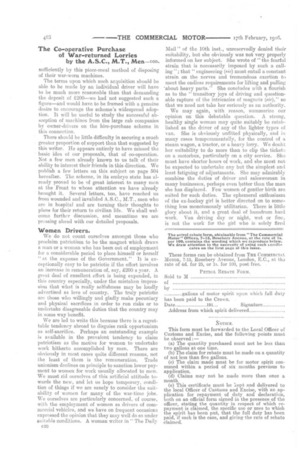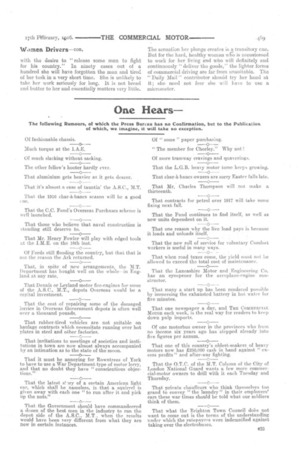The Co-operative Purchase of War-returned Lorries by the A.S.C., M.T., Men—con.
Page 2

Page 3

If you've noticed an error in this article please click here to report it so we can fix it.
sufficiently by this piece-meal method of disposing of their war-worn machines.
The terms upon which such acquisition should be able to be made by an individual driver will have to be much more reasonable than that demanding the deposit of £200—we had not suggested such a figure—and would have to be framed with a genuine desire to encourage the scheme's widespread adoption. It will be useful to study the successful absorption of machines from the large cab companies by owner-drivers on the hire-purchase scheme in this connection.
• There Bhould be little difficulty in securing a much • greater proportion of support than that suggested by this writer. He appears entirely to have missed the • basic idea of our proposals, that of co-operation. Not a few men already known to us talk of their ability to interest their friends in this direction. We publish a few letters on this subject on page 504 hereafter. The scheme, in its embryo state has already proved to be of great interest to many men at the Front to whose attention we have already • brought it. Several letters, too, have reached us from wounded and invalided A.S.C., M.T., men who are in hospital and, are turning their thoughts to plans for their return to civilian life. We shall welcome further discussion, and meantime we are pressing ahead with our detailed proposals.
Women Drivers.
We do not count ourselves amongst those who proclaim patriotism to be the magnet which draws a man or a woman who has been out of employment for a considerable period to place himself or herself " at the expense of the Government." It is exceptionally easy to be patriotic if the effort involves an increase in remuneration of, say, ,200 a year. A great deal of excellent effort is being expended, in this cotintry especially, under the mistaken impression that what is really selfishness may be loudly advertised as love of country. The truly patriotic are those who willingly and gladly make pecuniary and physical sacrifices in order to run risks or to undertake disagreeable duties that the country may in some way benefit.
We are led to write this because there is a regrettable tendency abroad to disguise rank opportunism as self-sacrifice. Perhaps an outstanding example is available in the prevalent tendency to claim patriotism as the motive for women to undertake work hitherto accomplished by men. There are obviously in most cases quite different reasons, not the least of them is the remuneration. Trade unionism declines on principle to sanction lower payment to women for work usually allocated to men. We must rid ourselves of this artificial attitude towards the new, and let us hope temporary, condition of things if we are sanely to consider the suitability of women for many of the war-time jobs. We ourselves are particularly concerned, of course, with the erriployment of women as drivers of commercial vehicles, and we have on frequent occasions expressed the opinion that they may well do so under suitable conditions. A woman writer in " The Daily e20 Mail" of the 10th inst., unreservedly denied their suitability, but she obviously was not very properly informed on her subject. She wrote of " the fearful strain that is necessarily imposed by such a "; that " engineering (sic) must entail a constant strain on the nerves and tremendous exertion to meet the endless requirements for lifting and pulling 'about heavy parts." She concludes with a flourish as to the "transitory joys of driving and questionable rapture of the intricacies of magnets (sic)," so that we need not take her seriously as an authority.
We may again, with reason, summarize our opinion on this debatable question. A strong, healthy single woman may quite suitably be established as the driver of any of the lighter types of van. She is obviously unfitted physically, and in many cases temperamentally, for the control of a steam wagon, a tractor, or a heavy lorry. We doubi; her suitability to do more than to clip the tickets on a motorbus, particularly on a city service. She must have shorter hours of work, and she must not be expected to undertake any but the simplest and least fatiguing of adjustments. She may admirably combine the duties of driver and saleswoman in many businesses, perhaps even letter than the man she has displaced. Few women of gentler birth are suited for such duties. The ephemeral enthusiasm of the ex-hockey girl is better directed on to something less monotonously utilitarian. There is little glory about it, and a great deal of humdrum hard work. Van driving day or night, wet or fine, is not the work for the girl who is solely fired with the desire to "release some man to fight for his country." In ninety eases out of a hundred she will have forgotten the man and tired of her task in a very short time. She is unlikely to take her work seriously for long. It is not bread and butter to her and essentially matters very little. The sensation her plunge creates is a transitory cue. But for the hard, healthy woman wro is accustomed to work for her living and who will definitely and continuously " deliver the goods," the lighter forms of commercial driving are far•from unsuitable. The "Daily Mail " contributor should try her hand at it; she, need not fear she will have to use a micrometer.




















